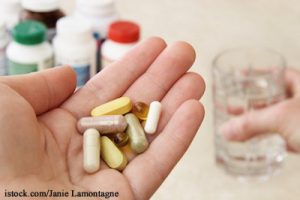The Food and Drug Administration, in one of its Consumer Updates, reminds you that mixing medications and dietary supplements can endanger your heath. Robert Mozersky , a medical officer at the FDA said, “Some dietary supplements may increase the effect of your medication, and other dietary supplements may decrease it.”
 Dietary supplements can change metabolism, absorption, and excretion of a medication and affect how it works. Mozerky added, “you may be getting either too much or too little of a medication you need.”
Dietary supplements can change metabolism, absorption, and excretion of a medication and affect how it works. Mozerky added, “you may be getting either too much or too little of a medication you need.”
One example of a supplement that interacts with prescription medications is St. John’s Wort. That supplement, which is often taken for depression, can make meds for HIV/AIDS, heart disease, depression, birth control pills, and treatments for organ transplants less effective. Other problematic supplements include Ginko biloba and vitamin E that can thin the blood. If you take those together, or take them with aspirin and/or a prescription blood thinner, you may increase your risk for stroke or internal bleeding.
Just because a product claims it’s “natural” doesn’t mean it’s automatically safe. For instance, arsenic is “natural,” but it’ isn’t safe to eat. Many weight loss products may claim to be “all natural” or “herbal”, but they can contain unapproved drugs or may interact with other prescription medications.
Children are especially vulnerable to this problem. Because a child’s metabolism is unique, at different ages they metabolize drugs and compounds at different rates. Always ask your pediatrician for advice before giving your child any type of dietary supplement.
And always tell your doctor about all of the supplements, over the counter (OTC) drugs, and medications you are taking. If you need surgery, it’s especially important to make sure the surgeon knows all of the pills you take. She may ask you to discontinue use of some supplements several weeks before the scheduled surgery.
Before you take a dietary supplement, talk to your doctor about it. And when you visit your doctor, bring a list of all the supplements and OTC drugs you take. If you want to add a dietary supplement to your daily regimen, ask a health care professional first.




